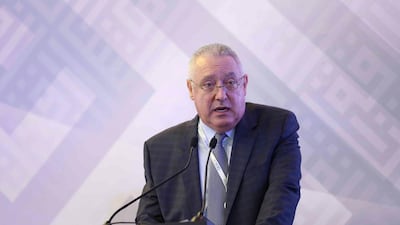The representative body for Arab carriers including Emirates and Etihad Airways seeks to quash a US proposal to remove a longstanding tax exemption for foreign airlines – a punitive measure it claims would hike costs for passengers and damage global networks.
The Arab Air Carriers Organisation (AACO) – whose 30-strong membership network also features Gulf Air, Oman Air, Air Arabia, Kuwait Airways and Saudia – raised concerns with global industry bodies this week, AACO's secretary-general Abdul Teffaha told The National via telephone.
“The notion of imposing income tax on foreign carriers belongs to the first half of the last century, not today’s globalised world,” Mr Teffaha said.
“We have communicated with the International Air Transport Association (IATA) and the United Nations’ International Civil Aviation Organization (ICAO) on the matter and are talking to other stakeholders and governments, as this could be very dangerous.”
An amendment to the US tax code proposed last week by US Senator Johnny Isakson of Georgia calls for airlines headquartered in foreign countries to pay corporation tax if the carrier’s home country has fewer than two arrivals and departures per week operated by major US airlines, and/or the carrier’s country does not already have an income tax pre-agreement with the US.
Under such treaties, companies from foreign countries are either exempt or pay a reduced rate on their income.
There are additional income tax exemptions for certain foreign airlines and these would be removed under Senator Isakson’s amendments, which relate to the state of Georgia.
“If this happens, it could set a precedent for other states to follow suit,” Mr Teffaha said. “That would raise costs for airlines significantly, dismantle the global network and deprive customers of choice.
“Ultimately, it would turn back the clock to a pre-Open Skies era when countries used to impose restrictions on carriers to balance their [involvement in the domestic market].”
_____________
Read more:
Emirates SkyCargo ties up with Dubai CommerCity
Yahsat to target low-cost carriers, e-commerce firms for in-flight Wi-Fi
_____________
If implemented, the new rules would deepen the rift between the three largest US airlines – United, Delta and American Airlines – and their Arabian Gulf counterparts, Emirates, Etihad Airways and Qatar Airways.
For years, the US carriers have lobbied federal government to curb Gulf carriers’ expansion in the states, which they claim represents “unfair competition” and breaches Open Skies agreements. Delta is headquartered in Atlanta, which sits within Senator Isakson’s constituency.
Reflecting a recent escalation of the dispute, the UAE’s flag carrier Etihad Airways said this month it will cancel all flights to Dallas-Fort Worth in Texas next year after American Airlines said it will terminate its codeshare with the Abu Dhabi-based airline in March.
Imposing tax on foreign airlines would be a “highly counterproductive move”, as the extra costs would end up being passed on to air passengers, Mr Teffaha said. “We would ask the relevant authorities to help international aviation operate unhindered, and not burden airlines with extra taxes that will ultimately be reflected in costs to passengers, hurting them.”
A spokesman for Etihad Airways said in a statement to The National: "Etihad Airways is aware of the language in the Senate tax reform bill, which is widely agreed to be inappropriate under US law and contrary to several international agreements.
“We are working with a broad coalition of industry representatives to inform lawmakers on this issue, which appears to be the result of continued anti-competitive efforts by one or more of the ‘Big Three’ US legacy carriers.”
Emirates declined to comment on the proposals.
IATA said it "does not support" the Isakson provision a spokesperson said in a statement to The National. The seamless experience of air travel "is possible only because governments cooperate across borders on rules and regulations that govern the industry," the spokesperson said. "Reciprocity between governments on taxation is a vitally important part of this cooperation. If enacted, the Isakson provision would upend decades of precedent--which the US has long supported--on the taxation of international aviation. It would directly impact multiple airlines from multiple countries. Foreign governments – even those not directly affected by the proposed language – could be tempted to follow the U.S. example and impose reciprocal taxes in return."
Senator Isakson was contacted for a response.
Mr Teffaha was speaking after AACO’s annual general meeting in the UAE on Tuesday, at which the membership body released its latest annual report, covering statistics from 2016.
AACO members’ operating revenues increased by 6.4 per cent year-on-year in 2016 reaching US$62 billion, the report said, with members serving 421 destinations in 126 countries with 3,991 average daily flights over the year.
The Arab air transport market grew by 9.9 per cent year-on-year in 2016 compared to the previous year, reaching 284 million passengers, the report added.
The number of passengers using Arab airports in 2016 increased by 4.9 per cent to 340.6 million passengers, while cargo handled at Arab airports increased by 5 per cent in 2016 to 8.11 million tons, AACO said.
“What is notable is the resilience of the Arab aviation market against increased geopolitical unrest in the region and persistently lower oil prices,” the secretary-general said.
“Growth has continued unabated despite these crises, with average RPKs (revenue per passenger kilometres) of member airlines going up 12 per cent in the last six years and substantial future growth possible due to the strategic geographical location the region occupies, its young, mobile population and value for money our airlines provide.”
He forecasts 250 million new passengers would enter the regional aviation market within the next decade as the sizeable under-25 demographic “comes of age”.

